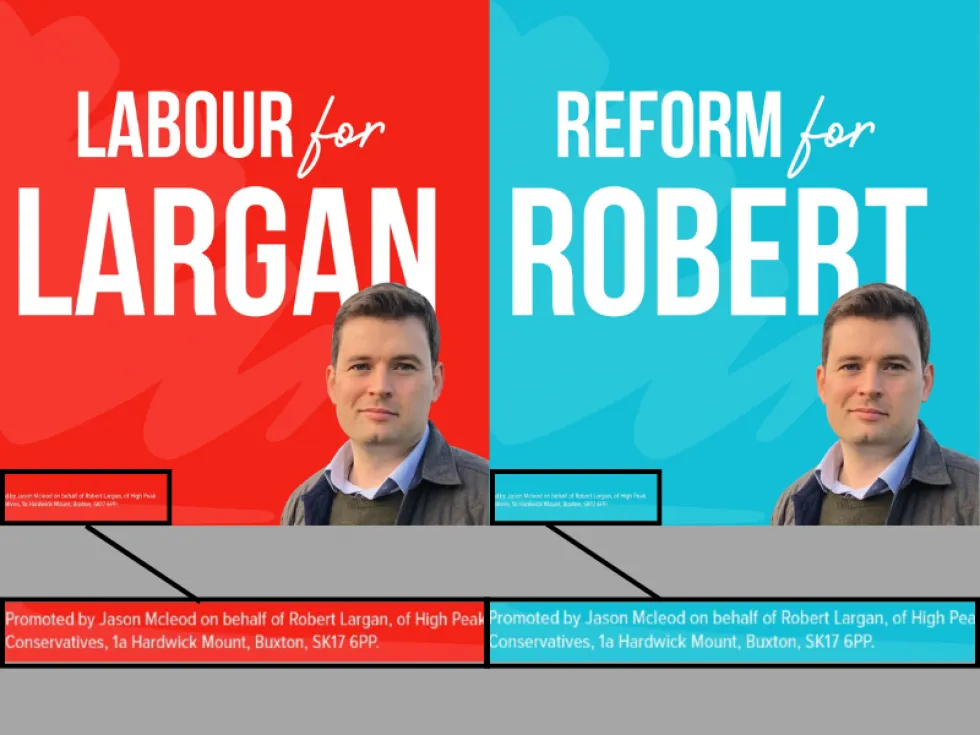By: Naledi Mashishi
June 3 2024
 (Source: Robert Largan/X)
(Source: Robert Largan/X)
Conservative former MP Robert Largan has drawn criticism after producing posters that give the appearance as though he is standing as a candidate for the Labour Party in the July 4 U.K. general election. The posters appeared on his X (formerly Twitter) account on June 1, 2024 and featured the words "Largan for Labour" and the Labour Party's signature red color. A second poster featuring him against a blue background with the words "Robert for Reform" was posted online on the same day, suggesting that they had also endorsed him as a candidate.
Largan is standing for election as a parliamentary candidate for High Peak, a constituency in the Peak District that encompasses the towns of Buxton and New Mills. The posters are part of a tongue-in-cheek campaign in which Largan argues that he was so popular as the MP of High Peaks that people have told him they will vote for him even though they are members of the Labour or Reform party.

The High Peak constituency in England. (Source: Wikimedia Commons/Open Street Map)
"So many local Labour voters have told me they're going to vote for me, because they want to keep me as their local MP. There have been so many that I'm launching a new Labour for Largan club," he posted on X. The campaign has also been launched on his website, which has tabs for "Labour for Largan," "Reform for Robert," and "Lib Dems for Largan."
The posters have been criticized for their potential to mislead voters due to Largan's use of Labour and Reform brand colors. Social media users took to X to question the legality of the posts, with some arguing that the posters may constitute electoral fraud.

Posts by X users questioning the legality of the campaign posters (Source: X/Screenshot/Composite by Logically Facts)
Derbyshire police have since posted that they are reviewing claims of electoral fraud. Communications officer Nicola Hall told Logically Facts, "Specialist detectives are reviewing the reports and will establish if any criminal offenses have taken place."
But the posters might not actually contravene electoral law. Orla Hennessy, media relations and communications manager for The Electoral Commission, told Logically Facts that the commission is responsible for ensuring that all campaign materials include information that identifies the person or organization that has published the material – known as an imprint.
"The digital imprint regime gives voters more information about who is trying to reach them online, including campaigners and political parties," Hennessy explained. "Voters should check for an imprint if they have concerns about the source of material."
This digital imprint is visible on both of Largan's posters. In the bottom left corner of both posters, the words, "Promoted by Jason McLeod on behalf of Robert Largan of High Peak Conservatives," followed by the Conservative Association's address. Largan's website also clearly states that he is a member of the Conservative Party.

Zoomed-in poster showing digital imprint that identifies Largan as a member of the Conservative Party (Source: X/Screenshot/Modified by Logically Facts)
Conservative Party regional press officer for East Midlands and East Anglia Macaulay Nichols told Logically Facts, "The materials clearly carry imprints, as required by electoral law."
However, the imprint itself is small, making it easy for a viewer to miss. X users have also pointed out that Largan has a history of creating misleading campaign materials, including a newsletter that mimicked a real newspaper and distributing leaflets that used Green Party colors.
At this stage, it is unclear whether the campaign materials have misled any voters. It does not appear to have done so yet on social media platforms, with most highlighting the potential breach of Electoral Commission rules. When we contacted the Committee on Standards in Public Life to see if this kind of tactic could be used to mislead voters, they replied that “…the Committee’s role is to carry out evidence-based reviews and we don’t comment on individual cases which are a matter for the appropriate regulator - in this case the Electoral Commission.”
Update: This article, first published on June 3, 2024, was updated on June 4 with a response from the Committee on Standards in Public Life.